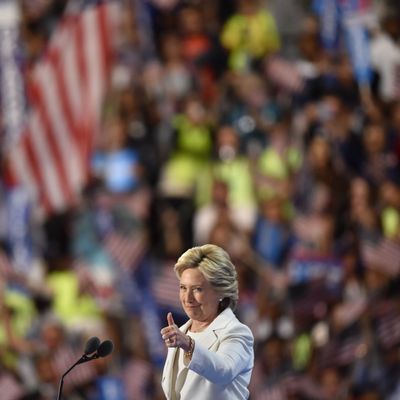
If you listened closely to Hillary Clinton’s speech to the Democratic National Convention, you could hear periodic shouts of protest from Bernie Sanders’s most recalcitrant delegates. But to hear echoes of the Vermont senator’s own voice, you didn’t have to strain your ears at all.
It would be easy to overstate Sanders’s influence on Clinton’s address in Philadelphia. The senator is such a devoted reciter of unsettling economic statistics, one could forget that he’s far from the only politician who’s fond of railing against the top one percent. And Clinton was deploying populist rhetoric about income inequality and the struggling middle class before Sanders had even declared his candidacy.
But on Thursday night, Clinton embraced two very specific tenets of Sanders’s political vision — ones that he used throughout the primary campaign to distinguish his theory of change from her own.
Last fall on Meet the Press, Sanders was asked to explain the difference between his political outlook and that of Establishment Democrats like Hillary Clinton and Barack Obama.
“Here is the difference in political outlook between the president and myself,” Sanders said. “What I understand is that the power of corporate America, Wall Street, the corporate media, is so great that real change to transform our country does not take place unless millions of people begin to stand up and say very loudly and clearly that the United States government has got to represent all of us, and not just the top one percent.”
At the opening of her acceptance speech in Philadelphia, Clinton endorsed this premise.
“I want to thank Bernie Sanders,” Clinton said. “And to all of your supporters here and around the country: I want you to know, I’ve heard you. Your cause is our cause. Our country needs your ideas, energy, and passion. That’s the only way we can turn our progressive platform into real change for America. We wrote it together — now let’s go out there and make it happen together.”
The only way we can make real change is through the energy and passion of a grassroots, left-wing movement. This is straight from Chairman Sanders’s little red book.
What’s more, the foregrounding of the Democratic platform is extraordinary. Typically, a party’s platform exists mostly as a way for its most ideological activists to blow off some steam. Donald Trump isn’t giving family-values conservatives all that much red meat to chew on, so they get to call for gay-conversion therapy in a document that he never has to read. But here, Clinton declared her support for what is, quite genuinely, the most progressive platform the Democratic Party has crafted in at least half-a-century (and obviously, the more economically progressive platforms of yesteryear had relatively little to offer on the rights of women, racial minorities, and LGBTQ folks).
Later in the speech, Clinton embraced a second core aspect of Sanders’s ideology — that the central problem with the American economy is not an inadequate education system or a lack of innovation, but rather, the fact that the wealthy exert an outsized influence over public policy.
“I believe that our economy isn’t working the way it should because our democracy isn’t working the way it should,” Clinton said. “That’s why we need to appoint Supreme Court justices who will get money out of politics and expand voting rights, not restrict them. And we’ll pass a constitutional amendment to overturn Citizens United! I believe American corporations that have gotten so much from our country should be just as patriotic in return.”
Clinton doesn’t explicitly say, “the reason the middle-class is struggling is because the billionaires have rigged the system.” But the logic of her remarks is rooted in that very kind of class analysis: The economy doesn’t work because there’s too much money in politics, and too few working people in the voting booths.
Clinton went on to suggest that government programs — funded by taxes on the rich — were the key to restoring prosperity to the middle class. The Democratic nominee proposed the “biggest investment in new, good-paying jobs since World War II” to restore America’s infrastructure. She vowed to make college tuition-free for the middle class, expand access to vocational training, provide affordable child care and family leave, and to finance such benefits by forcing “Wall Street, corporations, and the super-rich” to “start paying their fair share of taxes.”
Notably, Clinton’s speech hit a few populist notes that Sanders rarely (if ever) struck. Clinton criticized her own party for failing to make working-class people feel heard — and for failing to provide pathways to the middle class other than college.
“Americans are willing to work — and work hard. But right now, an awful lot of people feel there is less and less respect for the work they do,” Clinton said. “Democrats are the party of working people. But we haven’t done a good enough job showing that we get what you’re going through … And here’s something we don’t say often enough: College is crucial, but a four-year degree should not be the only path to a good job. We’re going to help more people learn a skill or practice a trade and make a good living doing it.”
This rhetoric appears to owe less to Sanders than it does to Donald Trump’s current dominance among white, non-college-educated voters. But regardless of its origins, it’s a more robustly liberal-economic message than we’ve heard from a Democratic standard-bearer in a long time.
There remain a lot of significant ideological differences between Clinton and the left-wing of the Democratic Party — on tax rates for the upper-middle class, single-payer health care, financial regulation, and, above all, foreign policy. But thanks, in part, to Bernie Sanders campaign, the American left made its voice heard in Philadelphia, and not just through unintelligible shouts rising up from the floor.






























